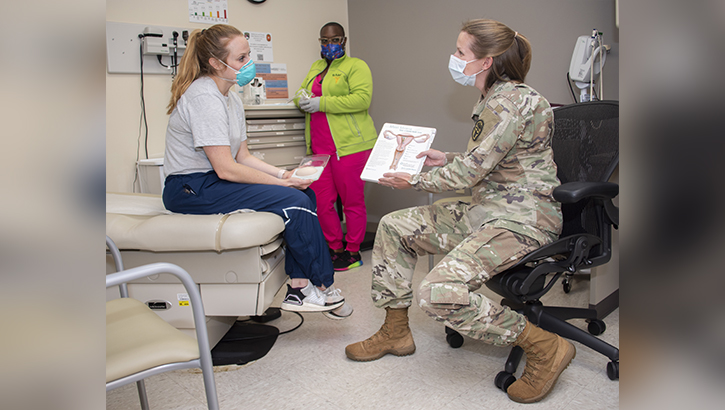 U.S. Army Maj. (Dr.) Kayla Jaeger, chief of Adolescent and Young Adult Medicine, discusses contraception options with a patient, U.S. Air Force Capt. Jacqueline Wade, while Benesha Jackson, a licensed vocational nurse, gathers instruments for an exam at the Capt. Jennifer M. Moreno Primary Care Clinic, Fort Sam Houston, Texas in 2021. (U.S. Army photo by Jason W. Edwards)
U.S. Army Maj. (Dr.) Kayla Jaeger, chief of Adolescent and Young Adult Medicine, discusses contraception options with a patient, U.S. Air Force Capt. Jacqueline Wade, while Benesha Jackson, a licensed vocational nurse, gathers instruments for an exam at the Capt. Jennifer M. Moreno Primary Care Clinic, Fort Sam Houston, Texas in 2021. (U.S. Army photo by Jason W. Edwards)
U.S. Army Col. Maria Molina, deputy director of DHA’s Education and Training directorate, said the VEC will improve provider-beneficiary collaboration, promote wellness, and unify patient education across the DHA.
“Providing patients with reputable, DHA-validated sources will empower patients to educate themselves and better participate in their health care management,” said Molina, who is also a doctor of obstetrics and gynecology.
“Health care providers can send factual medical information directly to patients by email or text following their appointments to aid in their recovery, treatment, or improve their overall health.”
During the VEC’s initial six-month pilot, providers and patients in women’s health, pediatrics, urology, pulmonology, behavioral health, gastroenterology, internal medicine, and infectious disease clinics can access nearly 50,000 educational resources covering over 60 medical specialties from more than 230 organizations.
Health care providers can send case-specific medical information directly to patients by email, and patients can research medical conditions, ways to stay healthy, and develop their own personal dashboard.
U.S. Army Brig. Gen. Deydre Teyhen, commanding general at Brooke Army Medical Center and deputy market director for the San Antonio market, said providing service members with accurate, timely health and medical information ensures they stay healthy and deployable, improving the readiness of the force.
“The health and readiness of our service members is paramount,” Teyhen said. “The VEC provides our medical professionals an up-to-date, validated tool for educating service members on everything from dental care to injury prevention. This translates to better health and wellness and deployment readiness.”
Providers and patients at the Capt. Jennifer M. Moreno Primary Care Clinic and McWethy Troop Medical Clinic will have access to the VEC beginning on Feb. 27. Following the six-month VEC pilot, a full rollout of the tool across all DHA hospitals and clinics is planned.
Additionally, work has begun to integrate this tool into the MHS GENESIS electronic medical record to create a seamless workflow for providers and health educators.
“Educating patients is critical to providing quality health care and improving force readiness,” Molina said. “Knowledgeable patients are more likely to use fewer emergency services, are better prepared to follow treatment instructions, and are more capable of asking informed questions during appointments.”